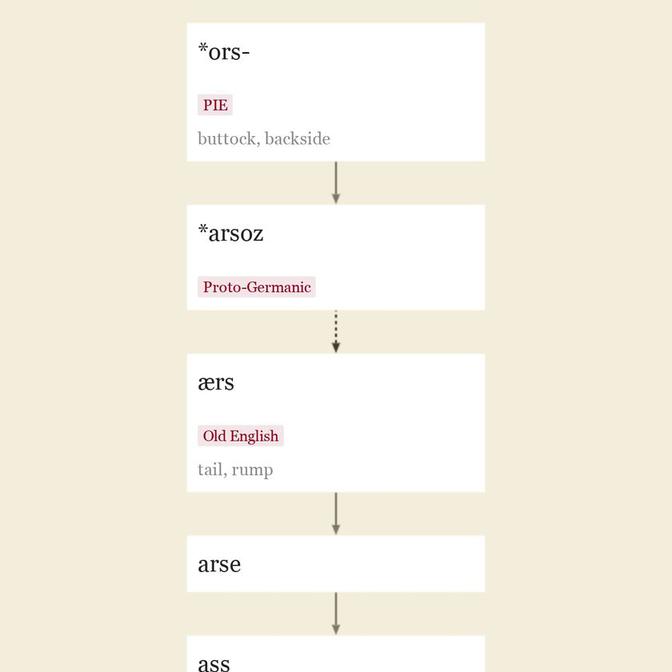ass-hole (n.)
也是 asshole,20世纪,可能是1880年代,美国英语的 arsehole 变体(还参见 ass(n.2))。意思是“可鄙的人”,始于20世纪30年代中期。早期,这个词是 ash-hole 的北英格兰和苏格兰方言变体,意为“炉底灰烬收集器”。赖特的《英语方言词典》(1898)列举了许多例子,比如,“告诉她一百次不要把火钩放在灰烬收集器里”[西约克郡]。
ass-hole 的相关词汇
约在1400年, arce-hoole; 参见 arse + hole(n.)。在古英语中,拉丁语 anus 被翻译为 earsðerl,字面意思为“屁股穿透”,其中的 thrill(n.)原意为“洞”(类似于 nostril)。

“后面”,1860年在航海俚语中被证实,从1930年开始流行,主要在美国,来自方言变体发音 arse(参见)。在 -s- 之前失去 -r- 并不罕见(burst/bust, curse/cuss, horse/hoss, barse/bass, garsh/gash, parcel/passel)。
从17世纪开始,可以追溯到从 arse 到 ass 的变化的间接证据。到1680年代, arse 的发音已经与“-ass”单词押韵,如在“Sodom or the Quintessence of Debauchery”中:“I would advise you, sir, to make a pass/Once more at Pockenello's loyal arse.”如果尼克· Bottom 在“仲夏夜之梦”(1594)中变成驴子是一些人认为的文字游戏,那么这可能早在莎士比亚时代就出现了。
I must to the barber's, mounsieur; for me thinks I am marvellous hairy about the face; and I am such a tender ass, if my hair do but tickle me, I must scratch. [Bottom]
我必须去理发店,先生; 因为我觉得我的脸上有很多毛发; 而且我是这样一个娇嫩的驴,如果我的头发只是轻轻地挠我,我就必须挠一下。[Bottom]
到1785年,有礼貌的说话者避免使用“驴”的意思。
“将女人视为性对象”的含义早在1940年代初就已经出现(似乎在1930年代的提华纳圣经中暗示了 piece of ass),但这个形象更早(比较 buttock “一个普通的妓女”,1670年代)。到1969年,“have (one's) head up (one's) ass”“不知道自己在做什么”已经被证实。俚语 (one's) ass “自己,自己的人”在1958年被证实。到1946年,“work (one's) ass off”“非常努力地工作”; 到1972年,“laugh (one's) ass off”“非常大声地笑”(从1965年暗示)。( stick it) up your ass 誓言在1953年被证实; 明显的委婉语表明早期的使用:
He snoighed up his nose as if th' cheese stunk, eyed me wi an air o contempt fro my shoon to my yed, un deawn ogen fro my yed to my shoon ; un then pushin th' brade un cheese into my hont ogen, he says "Take your vile bread and cheese and stick it up your coat sleeve, and be demmed to you. Do you think I want your paltry grub?" Un then, turnin on his heel, he hurried into th' perk. ["Bobby Shuttle un His Woife Sayroh's Visit to Manchester," 1857]
他嗤之以鼻,好像奶酪发臭,从我的鞋到我的头,用轻蔑的眼神看着我,然后从我的头到我的鞋,再次把面包和奶酪推到我的手中,他说:“把你那肮脏的面包和奶酪塞进你的衣袖里,去见鬼吧。你以为我想要你那微不足道的食物吗?”然后,他转身走进了公园。[“Bobby Shuttle un His Woife Sayroh's Visit to Manchester”,1857]